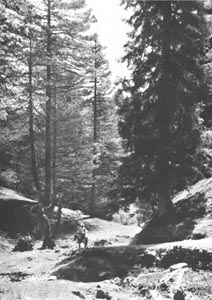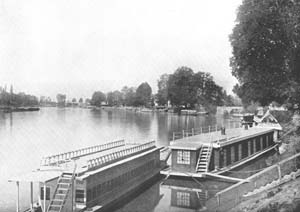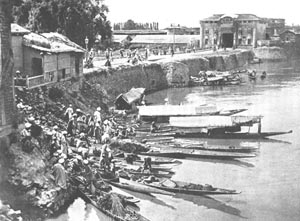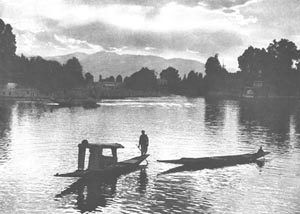Kashmir I
Sneh and I had decided for some time that our first leave would be spent in the Vale of Kashmir. She had never been there and we were both well aware of the reputation of beauty that it promised.
Abbas had arranged for us to meet a close relative of his who was Director of Education for Kashmir and Jammu and we had arranged to rent a houseboat for the period. As was to be expected my fellow officers knew of our arrangements and I was much envied. This was inevitable. Most of them had been parted from wives or girl friends and could only look forward to a package holiday or a trip to a hill station.
These hill stations provided a welcome relief from the heat of the plains, some of the most famous being Dalhousie and Mussoorie in the foothills of the Himalayas and 'Ootie' or Ootacamund (now Uthagamandalam) not far from Madras. Many of these are above 6,000ft and provided homesick Europeans with a glimpse of home with familiar fruits such as apples and pears, often in an area of wonderful views. Sometimes wives and families spent the entire summer periods in spouseless exile. Naturally some of them became bored and frustrated without husbands for long periods leading to lurid stories that lead the footloose to imagine that there would be easy pickings for predatory males.
Many of these stories circulated among the Indians and colourful imaginations did much to enhance visions of a modern Sodom and Gomorrah or whatever comparison would be used to enhance the vision. All rather rich considering the ancient worship of the 'lingam and yoni' (penis and female genitals) the general veneration of sex as in the wonderful carvings at the temple at Khaduraho and similar. The carvings are quite astonishing in their deep undercutting of the friezes quite apart from the athletic abilities of the ladies. I was told that the ideal breasts were such that a hair could be placed between them but that it would break if any attempt were made to remove it however, I digress.
No caress, kiss or sign of affection was shown when I met Sneh at the railway station. Even the slightest kiss would be plastered in the press as the lax morals of a film star or a perfidious insult to Indian womanhood. We set off due East for Srinagar and as soon as we entered the foothills of the Himalayas the country changed from the arid, brown plains that held and reflected stifling heat, the country started to change to green where the clouds finally released their rain. That, in itself gave an immediate feeling of well-being and the beautifully tended fields gave way to terrace after tiny terrace of paddy fields. It was as though the inner self were lying in a cool stream and one could actually see the tensions of everyday life washed out and drifting downstream; a brown sediment that attenuated until just the clear water remained leaving a feeling of being reborn. The little thatched huts blended so perfectly into the countryside that there was an immediate comprehension of how the legend of Shangri-La had grasped human imagination. The sense of being in a paradise continued as we climbed higher, eventually passing over the watershed at over 9,000ft.

The road to Gulmarg
[This photograph was taken a few years before our trip
and the road had been somewhat improved by then]
Our enjoyment was suddenly held in the suspension of a gasp as, near Gulmarg, we had stopped climbing and saw the Vale of Kashmir below us framed by the magnificent Himalayas and Nanga Prabhat, only a couple of thousand feet short of Everest itself. We use the word 'breathtaking' so glibly that when such an event occurs we are unprepared for the emotional impact. It was an experience that I can compare with so little: perhaps the first realisation of seeing the third dimension in looking through a telescope at the mountains of the moon, when I just wanted to know more but here, I felt that there could be no anticlimax. We almost reluctantly descended to the valley floor, which is itself over 5,000 ft above sea level.
All was bustle as we entered the city of Srinagar and we set about finding our houseboat. Our shikara was waiting for us. It was for all the world like an elegant Thames rowboat rowed by an ever-happy servant who was to be with us for the duration of our stay. He ferried us out to Dhal Lake with its row of houseboats, stopped at one and lowered the steps. I was instantly reminded of the luxury of the woodcarvings in the mess at Risalpur. The entire interior was finished in walnut that was deeply carved to the point that one had the feeling that the joiners must have loathed a flat surface to the point of paranoia. It was as well appointed as any yacht or car towed monstrosity but it was all as deeply heavy and ostentatious as a Victorian drawing room. We spent some time in exploring what was to be a most pleasant home for the next two weeks.

Houseboats on Dhal Lake
[Our houseboat was similar to that on the left,
but with the entry at the other end and superior:)]
Our servant had no trace of obsequiousness but had a constant smile and was ready for any service large or small, day or night. He slept on the shikara, ready to cook, take us wherever we wished and pointed out everything that he felt we should know. He dealt with the boats selling everything from vegetables to pins and needles, as we should undoubtedly have been swindled. There was a black market that would have done credit to wartime Vienna. So much so that I cabled my parents to ask them if there was anything they wanted!
Sneh busied herself making the boat 'us' with the flowers that she had bought in the city, everything was stowed away and we settled down for a well-earned sleep. The following morning we were met by the servant who, with a long face, handed me a telegram. It was plain that, to him, these messages carried nothing but bad news and he searched my face as I opened it.
"Return to squadron at once." Signed Ten Squadron Royal Indian Air Force". I tried to give nothing away and handed it to Sneh; she, taking her cue from me, said nothing. As soon as we were alone we discussed every possibility. We were fully aware of several officers who were just a little bit more than envious of my relationship with Sneh but surely no-one could be so stupid as to risk being found out in a forgery, if indeed, it was. I was most suspicious in that it must have been sent the day we left. We decided to sleep on it.
That afternoon we went by shikara to the city, hired a taxi and were just in time for tea with Abbas' cousin K.G.Saiyedin. He was, as we expected a 'big wheel' and we went straight to the garden where table and chairs were already laid. I have no idea what Abbas had said to his cousin but when we met it was with an instant rapport and he treated me as though we had been friends for years. He asked Sneh if she would mind meeting his wife as she was dying to meet her favourite film star. She laughed and said how she had always wanted to meet them both. A servant was told to fetch her and soon afterwards she was running across the lawn and the two ladies were gossiping and chatting and laughing as though they were old school friends. I was certainly not prepared for this as I had understood that K.G.'s wife was 'in Purdah' (A word meaning 'curtain' but indicating that the only men she would meet were those in her immediate family).

The Market Boats
She was dressed in the Punjabi costume of pyjama trousers with a loose jacket and when she spoke to me there was not the faintest trace of shyness but a direct, friendly and open approach. She was almost incredibly beautiful. She was as small as Sneh and very fine boned with lovely expressive hands and her eyes were large and lustrous. Her complexion was quite extraordinary. Her skin had never been exposed to the elements and looked smooth as silk. She turned to K.G. and asked if she could take Sneh in to meet the other ladies. They disappeared together across the immaculate lawn.
We chatted for a time about life, Abbas, Sneh, etc: He could not understand how I could live in a military environment and I told him of my fury at the German air raids. I heartily loathed service life and, as always, compared it to prostitution. However how would he have felt in similar circumstances? He was so like Abbas, even to the way that he cocked his head when asking a half mocking question. Quiet, slight, always probing, often ironic but never unkind. I adopted the same approach and gently teased him about his keeping such a beautiful wife in purdah. He told me that it was her choice and would be as ashamed to show her face in public, as a European girl would go about with her breasts bare. (We, neither of us, could anticipate the coming moral changes in Europe). I answered by saying that she was so spontaneous and friendly to me and she had never met me. His reply was all revealing. You are lucky: she likes you; after all we were both expecting to find you both as old friends.
The ladies were returning with that air of a shared secret that womankind uses to keep men at a disadvantage. We settled back to, of all things, cucumber sandwiches and tea. I looked across at Sneh and raised my eyebrows, she nodded and I told them of the telegram received that morning. He said "A difficult question'. 'Let us ask Hafiz." Bilquist ran in and returned with a large book of Hafiz' poetry. (I have no idea how to spell her name. It seems so unfair to inflict such a lovely creature with a name with an exaggerated cockney glottal stop in the middle). "As you know' said he (Know? I had no inkling) 'we always consult Hafiz when we are faced with a difficult problem." He then opened the pages at random and placed his finger on a verse. He smiled and read, "Do not concern yourself Lord. It is only jealousy that makes them behave thus."
He handed me the book and Sneh read it over my shoulder. We needed no other oracle. I ignored the telegram and heard no more, even when I made a halfhearted effort to trace it.
It is interesting that Hafez is the Persian poet who is most appreciated by the West. Persian, although written in Arabic script is an Indo European language and shares with English a great number of poets of distinction with a flowering period similar to that of the great Elizabethan poets.

Sunset on Dhal Lake
During our short stay we went there for a couple of garden parties during which, I note from a letter home that I was introduced to many dignitaries including the Chief Justice but he cannot have made much impression because I have not the slightest recollection of him.
Next: - Kashmir II
Previous: - The Prang
Edward Sparkes ©1998